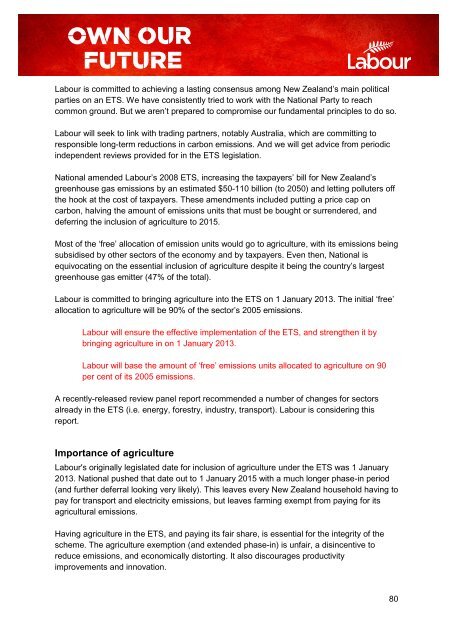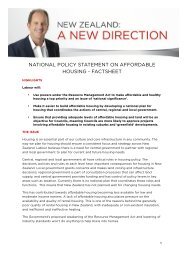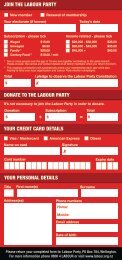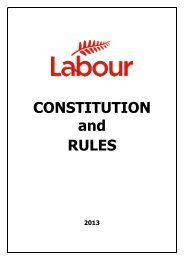- Page 2 and 3:
Contents ACCIDENT COMPENSATION ....
- Page 4 and 5:
ACCIDENT COMPENSATION Our vision: a
- Page 6 and 7:
instance, changes have impacted on
- Page 8 and 9:
Labour is concerned that increased
- Page 10 and 11:
Challenges are also being faced in
- Page 12 and 13:
Labour will review the Implementati
- Page 14 and 15:
Labour will ensure the following go
- Page 16 and 17:
or inflation. We agree with the app
- Page 18 and 19:
Marketing The value of New Zealand
- Page 20 and 21:
not encourage its best use. Farmers
- Page 22 and 23:
Our unique natural, social, and bui
- Page 24 and 25:
We have regularly reviewed and upda
- Page 26 and 27:
In 2001, only 6 percent of monthly
- Page 28 and 29:
We believe Māori arts, culture and
- Page 30 and 31: partnership with local and regional
- Page 32 and 33: Labour will work with local governm
- Page 34 and 35: Labour will continue to support Arc
- Page 36 and 37: Auckland Mayor & Council, and ensur
- Page 38 and 39: Labour will legislate for Urban Dev
- Page 40 and 41: National has relaxed the continuous
- Page 42 and 43: Balancing the demands of swift and
- Page 44 and 45: BROADCASTING Our Vision - Public in
- Page 46 and 47: improved cooperation and sharing of
- Page 48 and 49: Labour would have particular regard
- Page 50 and 51: This deal may still leave some home
- Page 52 and 53: Private insurers are remaining high
- Page 54 and 55: Labour will put $87 million towards
- Page 56 and 57: Many costly school property repairs
- Page 58 and 59: CHILDREN‟S POLICY Our vision Labo
- Page 60 and 61: Labour will increase the minimum wa
- Page 62 and 63: The funding for this Ministry will
- Page 64 and 65: New Zealand has a significant child
- Page 66 and 67: The policy would be rolled out in t
- Page 68 and 69: y providing adequate funding of out
- Page 70 and 71: These programs will be delivered fr
- Page 72 and 73: less. The National Government has a
- Page 74 and 75: For vulnerable children aged 18 mon
- Page 76 and 77: CIVIL DEFENCE Our vision Nothing is
- Page 78 and 79: International cooperation Regarding
- Page 82 and 83: Research into reducing the environm
- Page 84 and 85: Electric vehicles used for local tr
- Page 86 and 87: New Zealand is already a world lead
- Page 88 and 89: Capital Markets Development The Cap
- Page 90 and 91: the sole conduit for listing, which
- Page 92 and 93: A substantial degree of market powe
- Page 94 and 95: Engaging with the community: A soci
- Page 96 and 97: The Social Inclusion approach: How
- Page 98 and 99: The success of Whānau Ora will par
- Page 100 and 101: A comprehensive approach is require
- Page 102 and 103: initiatives. The government needs t
- Page 104 and 105: Creating sanctuaries supports the r
- Page 106 and 107: New Chums beach New Chums beach in
- Page 108 and 109: Helping private landowners DOC will
- Page 110 and 111: access. The Commission also promote
- Page 112 and 113: scientists investigating marine spe
- Page 114 and 115: Labour will work through internatio
- Page 116 and 117: Mining on other conservation land M
- Page 118 and 119: environmental impacts. Relying on t
- Page 120 and 121: Labour will offer lower rent to les
- Page 122 and 123: Prohibiting use of certain items as
- Page 124 and 125: the Telecom network. (Commerce Comm
- Page 126 and 127: In New Zealand there is limited mon
- Page 128 and 129: over 10 per cent on average and is
- Page 130 and 131:
Labour will ensure that NZDF bases
- Page 132 and 133:
At the same time, disability is a c
- Page 134 and 135:
The establishment of a national adv
- Page 136 and 137:
We remain committed to offering tho
- Page 138 and 139:
ECONOMIC DEVELOPMENT Our vision - H
- Page 140 and 141:
Australia‟s higher rate of saving
- Page 142 and 143:
Labour will introduce a Research an
- Page 144 and 145:
Sector Current Position Prescriptio
- Page 146 and 147:
New subsidiary boards will be forme
- Page 148 and 149:
Labour believes further stimulation
- Page 150 and 151:
Escalator programme (abandoned by t
- Page 152 and 153:
Labour‟s Principles UNIVERSAL AC
- Page 154 and 155:
Labour will develop a planned appro
- Page 156 and 157:
The division created by the Governm
- Page 158 and 159:
Māori Education Māori Participati
- Page 160 and 161:
Pasifika Languages We must remember
- Page 162 and 163:
e prevented or addressed early. The
- Page 164 and 165:
E-learning means learning and teach
- Page 166 and 167:
ITOs within key industries will cre
- Page 168 and 169:
School funding Supporting our Schoo
- Page 170 and 171:
Labour will make sure that schools
- Page 172 and 173:
A critical first step, and one whic
- Page 174 and 175:
limits to what can be achieved thro
- Page 176 and 177:
Training Organisation (ITO) is prop
- Page 178 and 179:
collective agreement negotiations a
- Page 180 and 181:
In the period leading up to the dev
- Page 182 and 183:
where the employer makes a signific
- Page 184 and 185:
Require a positive duty to advance
- Page 186 and 187:
This could mean moving to a regulat
- Page 188 and 189:
ENERGY Our vision New Zealand‟s r
- Page 190 and 191:
After many attempts to improve comp
- Page 192 and 193:
The previous Labour government bann
- Page 194 and 195:
investigate other opportunities to
- Page 196 and 197:
Labour will begin work on developin
- Page 198 and 199:
The grounding of MV Rena off Tauran
- Page 200 and 201:
Labour will insist on high environm
- Page 202 and 203:
The goods and services that make up
- Page 204 and 205:
desirable. That can be achieved thr
- Page 206 and 207:
Labour‟s vision is for healthy oc
- Page 208 and 209:
Labour introduced National Environm
- Page 210 and 211:
REFORMING THE EARTHQUAKE COMMISSION
- Page 212 and 213:
The $100,000 cap on home damage was
- Page 214 and 215:
The EQC cannot accept claims more t
- Page 216 and 217:
Integration of ethnic communities a
- Page 218 and 219:
Ensuring mainstream policies and se
- Page 220 and 221:
FINANCE Our vision - Owning Our Fut
- Page 222 and 223:
New Zealand needs to ensure that ou
- Page 224 and 225:
Labour will retain New Zealand‟s
- Page 226 and 227:
will implement an integrated packag
- Page 228 and 229:
development will help Kiwi companie
- Page 230 and 231:
Labour will reduce compliance costs
- Page 232 and 233:
Labour will review the existing com
- Page 234 and 235:
Labour will restart contributions s
- Page 236 and 237:
Summary We live in challenging time
- Page 238 and 239:
Promoting a successful, sustainable
- Page 240 and 241:
Labour will continue to establish a
- Page 242 and 243:
FOREIGN AFFAIRS AND OVERSEAS DEVELO
- Page 244 and 245:
With respect to Fiji, our commitmen
- Page 246 and 247:
Labour will explore the development
- Page 248 and 249:
To this end, we wish to engage with
- Page 250 and 251:
Replanting for conservation purpose
- Page 252 and 253:
Labour will, post Kyoto (2012), ins
- Page 254 and 255:
closely with the industry and key s
- Page 256 and 257:
HEALTH POLICY Our vision - Healthy
- Page 258 and 259:
A co-ordinated approach to address
- Page 260 and 261:
Problem gambling and drug and alcoh
- Page 262 and 263:
District Health Boards should provi
- Page 264 and 265:
In order to give every child the be
- Page 266 and 267:
Breastfeeding Support Labour introd
- Page 268 and 269:
All New Zealanders have the right t
- Page 270 and 271:
Ensure DHBs set targets for access
- Page 272 and 273:
Labour will support an integrated a
- Page 274 and 275:
Establish regulations for minimum s
- Page 276 and 277:
on mental health services inevitabl
- Page 278 and 279:
Labour will implement the recommend
- Page 280 and 281:
Labour will work towards greater op
- Page 282 and 283:
Under National the access and affor
- Page 284 and 285:
The last Labour Government kick-sta
- Page 286 and 287:
Labour will over time develop natio
- Page 288 and 289:
Labour will reaffirm Housing New Ze
- Page 290 and 291:
In New Zealand the community housin
- Page 292 and 293:
The road back to housing affordabil
- Page 294 and 295:
Labour will continue with the Welco
- Page 296 and 297:
Employer contributions will gradual
- Page 298 and 299:
This deal may still leave some home
- Page 300 and 301:
DIGITAL NATION: INFORMATION AND COM
- Page 302 and 303:
One final concern is that, compared
- Page 304 and 305:
Labour will as an underlying princi
- Page 306 and 307:
Around 20% of New Zealand household
- Page 308 and 309:
creative content. They simply want
- Page 310 and 311:
Open Software: revolutionising gove
- Page 312 and 313:
Labour notes the strategy includes
- Page 314 and 315:
Labour will review the Skilled Migr
- Page 316 and 317:
If we expect migrants to New Zealan
- Page 318 and 319:
INTERFAITH DIALOGUE Our vision For
- Page 320 and 321:
Labour will commit to building harm
- Page 322 and 323:
Labour will boost research and deve
- Page 324 and 325:
Labour will encourage the training
- Page 326 and 327:
These young New Zealanders are most
- Page 328 and 329:
ecommend improvements. Labour belie
- Page 330 and 331:
Implement the 2007 Report of the Hu
- Page 332 and 333:
derived from rationalising this exp
- Page 334 and 335:
Restoring the democracy in Auckland
- Page 336 and 337:
KAUPAPAA MĀORI O TE ROOPU REIPA 20
- Page 338 and 339:
Labour believes in an evidence base
- Page 340 and 341:
Labour will reintroduce intensive c
- Page 342 and 343:
Labour will encourage restorative j
- Page 344 and 345:
Labour believes we must have moneta
- Page 346 and 347:
OPEN GOVERNMENT Our vision - Transp
- Page 348 and 349:
● Engaging citizens directly in p
- Page 350 and 351:
Improving the quality of the work o
- Page 352 and 353:
training and social needs are met a
- Page 354 and 355:
Jobs and skills New Zealand will be
- Page 356 and 357:
languages so Pacific children have
- Page 358 and 359:
Labour will develop and implement a
- Page 360 and 361:
Labour will require all rental prop
- Page 362 and 363:
improved pre-departure information
- Page 364 and 365:
Pacific leadership Since the first
- Page 366 and 367:
ecomes predatory when it‟s carrie
- Page 368 and 369:
MAKING GOVERNMENT PROCUREMENT WORK
- Page 370 and 371:
All IPPs must be approved by a newl
- Page 372 and 373:
A prosperous and dynamic sector wit
- Page 374 and 375:
RAINBOW ISSUES Our vision Labour be
- Page 376 and 377:
RESEARCH, SCIENCE AND TECHNOLOGY Ou
- Page 378 and 379:
Ministers on science and innovation
- Page 380 and 381:
etween our leading scientists in un
- Page 382 and 383:
The government should continue to s
- Page 384 and 385:
Those same people are now having to
- Page 386 and 387:
Labour believes that quality educat
- Page 388 and 389:
Labour will leave those extra polic
- Page 390 and 391:
Labour believes that focusing resou
- Page 392 and 393:
Dealing effectively with organised
- Page 394 and 395:
Promoting safety: Outside the wire
- Page 396 and 397:
We recognise that the 0.5 per cent
- Page 398 and 399:
The implications for relationship p
- Page 400 and 401:
We know that for the great majority
- Page 402 and 403:
Labour will gradually lift the age
- Page 404 and 405:
Labour will develop sustainable and
- Page 406 and 407:
Establish regulations for minimum s
- Page 408 and 409:
Labour believes the ACC operational
- Page 410 and 411:
Also, these loans are contingent on
- Page 412 and 413:
Labour will create a $5,000 tax fre
- Page 414 and 415:
Personalised support for those who
- Page 416 and 417:
Labour will treat voluntary work wi
- Page 418 and 419:
Labour‟s Social Inclusion approac
- Page 420 and 421:
It will take time and commitment to
- Page 422 and 423:
SPORT AND RECREATION Our vision Spo
- Page 424 and 425:
young people working after school o
- Page 426 and 427:
Education, and use Sparc as a catal
- Page 428 and 429:
Labour will organise planned and de
- Page 430 and 431:
practices, in family friendly workp
- Page 432 and 433:
For more information see Labour‟s
- Page 434 and 435:
fully developed, consulted and nego
- Page 436 and 437:
Institutes of Technology and Polyte
- Page 438 and 439:
Labour will ensure a focus on the n
- Page 440 and 441:
encourage young and energetic teach
- Page 442 and 443:
National and ACT have enacted legis
- Page 444 and 445:
There is a need for business mentor
- Page 446 and 447:
training opportunities are availabl
- Page 448 and 449:
TRADE Our vision We are a country t
- Page 450 and 451:
To promote opportunities to leverag
- Page 452 and 453:
Labour will reform monetary policy
- Page 454 and 455:
Labour will examine ways to maintai
- Page 456 and 457:
Labour will continue to support fun
- Page 458 and 459:
will recapture the momentum we star
- Page 460 and 461:
Electric cars and other vehicles La
- Page 462 and 463:
TREATY OF WAITANGI Our vision The T
- Page 464 and 465:
Central to these will be an expert
- Page 466 and 467:
their land use to meet required env
- Page 468 and 469:
Most people - rural and urban - do
- Page 470 and 471:
A fair price, in the form of a reso
- Page 472 and 473:
WOMEN‟S POLICY Our vision - Real
- Page 474 and 475:
legislative and policy changes requ
- Page 476 and 477:
Labour will immediately restore $13
- Page 478 and 479:
Labour will continue further alignm
- Page 480 and 481:
Sexual and Reproductive Health Labo
- Page 482 and 483:
YOUTH AFFAIRS Our vision New Zealan
- Page 484 and 485:
Youth health New Zealand has one of
- Page 486 and 487:
YOUTH EMPLOYMENT PACKAGE Our vision
- Page 488 and 489:
Empowering local government to work
- Page 490 and 491:
„majors‟ which a student should
- Page 492 and 493:
To be eligible, the young person mu
- Page 494 and 495:
subsequently being dropped. There i
- Page 496 and 497:
2 20 Hours Free · 65, 71, 72, 74,
- Page 498 and 499:
148, 149, 153, 154, 164, 168, 180,
- Page 500 and 501:
genetic modification · 208, 209 gl
- Page 502 and 503:
maternity · 67, 68, 264, 265, 267,
- Page 504 and 505:
258, 260, 277, 278, 301, 306, 322,
- Page 506:
V Varroa mite · 42 vehicle · 7, 8





